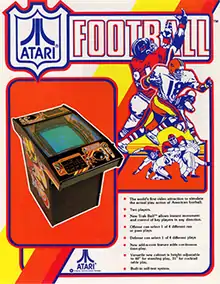Football (1978 video game)
Football (also known as Atari Football) is a 1978 American football video game developed and released by Atari, Inc. for arcades. Players are represented by Xs and Os. While predated by Sega's World Cup, Football is credited with popularizing the trackball controller and is also the first non-racing vertically scrolling video game.[4] It distributed in Japan by Namco in 1979.
| Football | |
|---|---|
 Arcade flyer | |
| Developer(s) | Atari, Inc. |
| Publisher(s) | |
| Designer(s) | Steve Bristow |
| Programmer(s) | Michael Albaugh[2] |
| Platform(s) | Arcade, Atari 2600 |
| Release | |
| Genre(s) | Sports |
| Mode(s) | Single-player, multiplayer |
Football was the second highest-earning arcade video game of 1979 in the United States. That year Atari released a more challenging four-player version of the arcade game programmed by Dave Theurer, who later created Missile Command and Tempest.
An Atari VCS home version of Football was published in 1978.[5] It uses blocky representations of players instead of Xs and Os. In 1982, Atari replaced it with RealSports Football.
Development
The game was designed by Steve Bristow and programmed by Michael Albaugh, with the hardware engineered by Dave Stubben. The game's use of a trackball was inspired by an earlier Japanese association football (soccer) game that had used trackball controls.[6][7] When the team saw the game, they brought a cabinet to their lab and imitated the trackball controls.[7]
An earlier association football game that used trackball controls was Sega's World Cup, released seven months earlier in March 1978.[8][9] However, Steven L. Kent reported in 2001 that Stubben attributed the earlier trackball soccer game to Taito.[7] In a later 2017 interview, Albaugh said he was uncertain which company it was from, but remembers it was from a Japanese company.[6]
Atari's Football was released in October 1978.[3]
Ports
On the Atari VCS, two teams of green and white players, each of four men, playing against each other. In a first game-option, before each play the player can select a formation, and then during each play the player controls their movement as a unit using the joystick controller. In a second game option, the player only chooses the formation with the play being carried out automatically according to a pre-selected plan. A third game-option is similar to the second except that the user may kick or punt at any time.[10]
Reception
Football was the second highest-earning 1979 in the United States, below only Space Invaders (1978).[11]
In his October 1979 review of the Atari VCS version of the game in Creative Computing, David H. Ahl gave the game a positive review. He praised particularly the gameplay which he described as "boast[ing] lively action".[10]
Legacy
Although not the first trackball game, predated by Sega's World Cup in March 1978,[8][9] Atari Football is credited with popularizing the trackball.
See also
- List of Atari 2600 games
- Gridiron Fight - 1985 American football game from Tehkan (Tecmo)
- Cyberball - 1988 American football game from Atari
References
- "Foot Ball". Media Arts Database. Agency for Cultural Affairs. Retrieved 31 May 2021.
- Stilphen, Scott (2017). "Michael Albaugh interview". Atari Compendium. Retrieved 2 May 2021.
- "Production Numbers" (PDF). Atari. 1999. Retrieved 19 March 2012.
- Words: GamesRadar US on October 8, 2010 (2010-10-08). "Gaming's most important evolutions". GamesRadar. Retrieved 2013-02-13.
- "Football". Atari Mania.
- Stilphen, Scott (2017). "Michael Albaugh interview". Atari Compendium. Retrieved 2 May 2021.
I saw a soccer game with one (I remember only that it was Japanese, and a soccer game. Taito is plausible)
- Kent, Steve L. (2001). The ultimate history of video games: from Pong to Pokémon and beyond : the story behind the craze that touched our lives and changed the world. Prima. p. 118. ISBN 0-7615-3643-4.
Contrary to a popular notion, Football was not the first game to use a trak-ball controller. According to Dave Stubben, who created the hardware for Atari Football, Taito beat Atari to market with a soccer game that used one. According to Steve Bristow, when his engineers saw the game, they brought a copy into their lab and imitated it.
- Sega Arcade History. Famitsu DC (in Japanese). Enterbrain. 2002. p. 34.
- "WORLD CUP(ワールドカップ)". Sega (in Japanese). Retrieved 2 May 2021.
- Ahl, David H. (October 1979). "Atari Video Computer Cartridges - Football". Creative Computing. 5 (10): 38. Retrieved 4 September 2019.
- "Video Games". RePlay. November 1979.